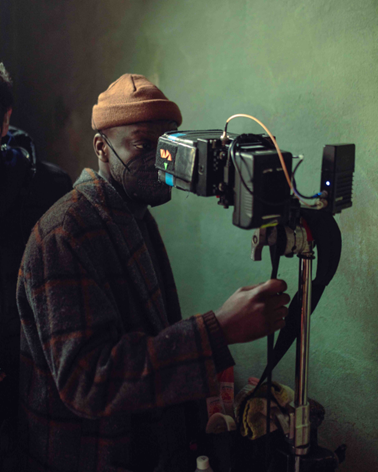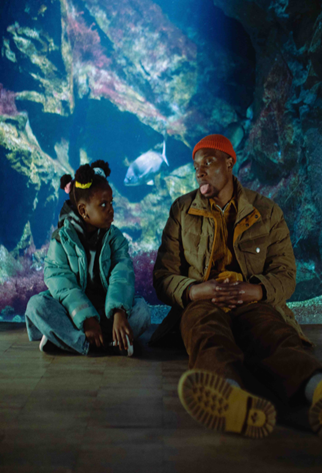Black History Month: Italian Black Cinema Debut in USA
- Veronica Costanza Ward
- Feb 11, 2023
- 8 min read
Updated: Feb 12, 2023

National African American History Month, also known as Black History Month, was conceived by notable historian Carter G. Woodson and other prominent African Americans to commemorate and celebrate the contributions of African Americans to the United States. Since its 1926 inception, Black History Month has become a celebration of "African Diaspora,” and since 1976, every U.S. president has officially designated the month of February to celebrate it.
Curated by Italian-Ghanaian-American producer-director Fred Kudjo Kuwornu, Black Italian Film Showcase is the first celebration of Afro-Italian talents in film, showcasing new features, documentaries, and short films and illuminating the historical, social, and cultural aspects of Black life in Italy through film, offering the opportunity to see a diverse representation of Italy.
This retrospective of Italian of African descent filmmakers deals with questions of colonialism, diversity, global black diaspora, gender, race, and identity that are best answered by those who live Italy’s integration day to day.
We’ve met the curator Fred Kuwornu who will tour from San Francisco to Chicago during the Black History Month and over.
Interview with Fred Kuwornu
Fred, When Did Your Work on Black Italian Film Start and Why?
Recalling my first steps I could say my work started a decade ago when I was producing and directing my first documentary: Inside Buffalo. During the promotion of the film in the United States I understood how many Black outlet events were there in U.S. I remember the time I attended at my first Black Film Festival in Alabama and I was surprised that there were Black festival programmer, organizer and of course directors. I was wondering when Europe could have something similar. After a decade and after building a network of people and institutions involved and willing to support Black Italy I had decided that that was the right time to bring Black Italian Cinema Series around the world and in Italy (laughs). I feel lucky to have an hybrid professional life which brings me from documentary produtiction to teaching and researching in Academias, organizing cultural events and shools, collecting and analyzing data about the Blakc presence in Italy. What I’ve seen in U.S., in term of Black culture and organizations, has been an important example and push to create initiatives around the Italian-sphere involving Italians around the world as well as ‘Italy lovers’.
Italy is the First Country of Many African Immigrants’ Journey to Western Europe. Last Two Decades Have Seen a Strong Immigration Wave Due to Social Struggles, Wars and Poverty in Many African Countries. How Has Italian Black Social Issue Evolved?
I think Blackness in Italy is at a difficult moment not only in Italy but also in Europe and is because we are witnessing geopolitical changes and an economic and cultural decrease of European values. Of course, many Afro-Italians are becoming a significant and strong part of society and we live some changes, but if I look at the big picture these years are full of challenges for the entire Black diaspora in Europe. When I grew up in Italy, in the seventies an eighties, the main reaction to blackness was curiosity and fascination for exoticism of a kid like me. This sometimes helped me feeling in my comfort zone and at the same time created me a sense of confusion: I wasn’t part of the country's representation but I didn’t feel a systematic exclusion. Even though the number of African descents in Europe are 100,000 more than four decades ago young people have a different consciousness but feels a lack of opportunity and this is the craziest thing!
Immigration now is used by the far-right parties to scare and convince white Italians of the danger of immigration and shaping the idea of fortress and defense need, in different ways including the resistance to a change in how Italy narrates itself. I’m proud of being an example for many young kids in the country and African descents who are slowly gaining access to the "arena" of the Italian mainstream culture. When I was a kid my only role models were African-American music stars and athletes. What scares me is the negative trajectory that Europe is taking in this last period and I hope this will not further negatively impact European Black Diaspora who lives in Europe.
2023: How is The Black ‘Image’ Considered In Italian Culture and Society Nowadays and How Much Have Arts and Cinema Helped Giving a Real Picture of Afro Italians, Especially Second and Third Generations Life, Thoughts, Dreams Constantly Dealing with Present And Heritage?
Art it's fundamental a fundamental tool to show that "we exhisist". This is a huge statement in a society, like Italy, that has difficulties to imagine itself as non-white, The fact that a lot of storytellers are emerging in the Italian society it's also a form of counter-narrative about how the society had represented Black in Italy with a lot of stereotypes and prejudice. We are trying to tell not only the current lives of Afro-Italains but many of us are also involved to find our present in Italian history, connecting the dots of our presence which started during the Roman empire. My team and I are now touring with a selection of films and the feedbacks of African Americans and Americans which is positive, is very precious to us in terms of narration method.
As a Producer and Director What Do You Wish for Black Motion Pictures and Tv Products in the Next Future? What Should the Italian Industry, Politics and Culture Institutions Do to Support and Promote Black Films Around the World?
Italian institutions should understand that inclusion and equity are not the same thing and that the second one is way more important in life as in all through the process of the film making, in the film industry. We desperately need institutions to fund programs which support talents in all the different segments of film making from acting and directing to also production, maybe even support the creation of black owned production companies. In 2013 I opened my company production Do The Right Films. Hedy Krissane and I are the only Afro-Italian owners of a company production and we are still support and mentor our fellows to become producers and owners too. But with very little support. We decided to take a big risk, to believe in a dream that can be of more.
Fred, What are Your Next Projects, Where is The Black Italian Film Showcase Moving To?
We have a lot of requests for Black Italian Film Showcase and this project will turn soon into another similar but wider package experience. There are many small and unknown productions in the world made by African descents storytellers and talking about me I can say a little step has been made: as Italian, Ghanaian and US Citizen, I’m now receiving the support by U.S. Institution, Ghanaian government, and Italian organizations as the Italian Cultural Institutes network, and this is so important for us.
I would like to underline how BIFS had started with the contribution and support of a dozen filmmakers, men and women, young and less young artists who can offer a meaningful experience and discussion on Black Cinema in Italy future.
The big news is that I’m working on my next documentary "We Were There" about the African presence in Renaissance Europe. I started filming last year in Italy and Portugal and I will move to Spain and Belgium, Netherland, U.K. and France.
Films

“I am Fatou” directed by Amir RA
2020, 19’, Italian with English subtitles
Fatou is a 23-year-old Italian girl of Senegalese origin. She lives in a suburb of Rome with her mother, who would like to educate according to the rigid impositions of her culture of origin. But Fatou is looking for her own identity that combines her black Muslim being with Italian society, and unlike most of her peers, the social stigma of the immigrant is imprinted on her, isolating her and impacts her friendships with other young children of foreigners. A universal reflection on the sense of identity, so longed for and, for many, never really possessed.

“Idris” directed by Kassim Yassin Saleh
2017, 13’, Italian with English subtitles
On a day in mid August, Idris finds himself in a foreign country, without his parents, cared for by a shelter home populated by socially awkward demons, 5 to 14 years old. He’s forced to socialize, playing in a rundown public pool with them. An easy game:fetch some hardware parts from the bottom of the pool. He already came afloat once, swimming back to a boat in the middle on the sea. Will he decide to join his new family waiting for him at the side of the pool?

“Il Moro” (The Moor) directed by Daphne Di Cinto
2021, 22’, Italian with English subtitles
Alessandro de' Medici, son of an enslaved African woman and of Pope Clement VII, becomes the first Duke of Florence. Will he be able to demonstrate that his African origins can go hand in hand with belonging to the Medici family?
LONG FEATURES

“Autumn Beat” directed by Antonio Dikele Distefano
2022, 103”, Italian with English subtitles
“Autumn Beat” produced by Amazon Studios and co-produced by Indiana Productions is an exciting and unprecedented story about Black culture in Italy, and the role of music as a means of redemption and search for identity. Two brothers, Tito and Paco have the same dream: to break into the rap music world. Paco is a born performer and Tito knows how to write like no other but ambition, life, and love for the same woman will test their bond.
Italian writer-director Antonio Dikele Distefano, who is the originator of groundbreaking Netflix original series “Zero” that in 2021 marked Italy’s first show centered around the present-day lives of black Italian youth.

“Blaxploitalian: 100 Years of Blackness in Italian Cinema” directed by Fred Kudjo Kuwornu
2016, 65’, Italian and English with English subtitles
A documentary that uncovers the careers of a population of entertainers never heard from before: Black actors in Italian cinema. With modern day interviews and archival footage, the documentary discloses the personal struggles and triumphs that classic Afro-Italian, African-American and Afro-descendant actors faced in the Italian film industry, while mirroring their struggles with those of contemporary actors who are working diligently to find respectable, significant, and non-stereotypical roles, but are often unable to do so.

“Va Pensiero, Walking Stories” directed by Dagmawi Yimer
2013, 55’, Italian with English subtitles
An interwoven account of two racist attacks in Milan and Florence and the victims’ painful attempts to piece the fragments of their lives back together. This powerful account brings together the overlapping stories of the three protagonists’ ordeal and their enduring hope of building a life in Italy, despite the fear and uncertainty of suddenly being plunged back to the moment of the attacks by one look or gesture.

This program is part of Chi Siamo: (Re)presenting Italian Culture, the theme selected for 2023 by the Italian Cultural Institute of Chicago. This year-long series will explore the topics of representation and inclusion in Italian arts, with a specific focus on cross-cultural contamination in contemporary and modern Italy.
Upcoming Events
San Francisco
January 31
Italian Cultural Institute at 6.30 PM
"Blaxploitalian"
Q&A with director Fred Kuwornu in attendance
February 11
3:30 PM Roxie Theater, 3117 16th St
"Autumn Beat"
Q&A with director Antonio Distefano in attendance
February 21
Italian Cultural Institute at 6.30 PM
"La Mia Milano"
"Idris"
"Guess who I'm bringing to dinner"
"The Moor"
"I will not forget you"
CHICAGO
February 18
Facets Cinema at 5 PM
"Idris"
"Autumn Beat"
Q&A with director Antonio Distefano in attendance
Q&A with director Fred Kuwornu in attendance
February 19
Facets Cinema
"The Moor"
"Blaxploitalian"
"I am Fatou"
" Va' Pensiero - Walking Stories"
Detroit
February 17th at 5:00pm
“Idris”
"Autumn Beat"
Q&A with director Antonio Distefano in attendance
February 18th at 2:00 PM
“I am Fatou”
“Va Pensiero, Walking Stories”
“I will not forget you”
“Blaxpoitalian”










